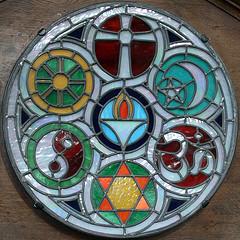 Religion
Religion

Don's Home
 Religion
Religion

|
 Under Construction. Under Construction.
Unitarians are less likely to argue about such strictly theological issues today. We now place more stress on the importance of liberty of conscience in matters of faith. With its historical roots in the Jewish and Christian traditions, Unitarian Universalism is a liberal religion -- that is, a religion that keeps an open mind to the religious questions people have struggled with in all times and places. Many Unitarians consider themselves Christians, but others embody different spiritual traditions; see below. Most celebrate Christmas and Easter. According to Unitarianism at Wikipedia, The Unitarian movement, although not called "Unitarian" initially, began almost simultaneously in Poland-Lithuania and Transylvania in the mid-sixteenth century.
According to Unitarian Universalism at Wikipedia, The roots of Unitarian Universalism are in liberal Christianity.
| |
|
The theology of individual Unitarian Universalists ranges widely, including Humanism, Atheism, Agnosticism, Pantheism, Deism, Christianity, Judaism, Neopaganism, Hinduism, Buddhism, and many more.
Today they draw from a variety of religious traditions. Individuals may or may not self-identify as Christians or subscribe to Christian beliefs. Unitarian Universalist congregations and fellowships tend to retain some Christian traditions, such as Sunday worship with a sermon and the singing of hymns. The extent to which the elements of any particular faith tradition are incorporated into personal spiritual practice is a matter of individual choice for congregants, in keeping with a creedless, non-dogmatic approach to spirituality and faith development. |
 Stained glass roundel
Stained glass roundelThe Octagon Unitarian Chapel Norwich, Norfolk, England, UK |
|
According to Religion 101: NJ Unitarian Universalist , Universalists became an organized religion in 1763 and the Unitarians followed suit in 1825. The Universalist Church of America, established in 1866. They combined resources and become one faith, the Unitarian Universalist Association (UUA), in 1961. See Unitarian Universalist Association (UUA) Beliefs
Principles:
Morristown Unitarian Fellowship Mission and Covenant Statement:
Unitarians are very environmentally conscious. See Environmental Justice - UUA US founding fathers John Adams (2nd U.S. President) and John Quincy Adams (th U.S. President) were Unitarians and Thomas Jefferson was an exponent of ideas now commonly associated with Unitarianism. Charles Darwin was also a Unitarian.
According to Unitarian faith growing nationwide | USA Today 2012 there are about 211,000 Unitarian Universalists in the U.S. There are about 800,000 worldwide.
Links
| |